|
|
|
Sort Order |
|
|
|
Items / Page
|
|
|
|
|
|
|
| Srl | Item |
| 1 |
ID:
077423
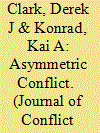

|
|
|
|
|
| Publication |
2007.
|
| Summary/Abstract |
The authors study conflict on multiple fronts. A defending player needs to successfully defend all fronts, and an attacker needs to win at only one. Multiple fronts result in a considerable disadvantage for the defending player, and even if there is a defense advantage at each of them, the payoff of the defending player is zero if the number of fronts is large. With some positive probability, in the equilibrium defending players surrender without expending effort
|
|
|
|
|
|
|
|
|
|
|
|
|
|
|
|
| 2 |
ID:
142097
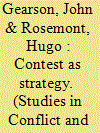

|
|
|
|
|
| Summary/Abstract |
The appropriateness of the United Kingdom's counterterrorism strategy, known as CONTEST, divides opinion. This article reassesses CONTEST as strategy rather than simply examining its effectiveness as policy, or critiquing its individual parts. Reviewing the development of CONTEST in the context of wider analytical discussions on what makes for good strategy, the authors argue that several important strands of CONTEST are either underdeveloped or not yet as “strategic” as some analysts and the U.K. government itself have professed them to be. Fresh thinking on aspects of counterterrorism is urgently needed to counter the challenge of contemporary and future terrorism.
|
|
|
|
|
|
|
|
|
|
|
|
|
|
|
|
| 3 |
ID:
123563
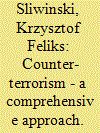

|
|
|
|
|
| Publication |
2013.
|
| Summary/Abstract |
The global war on terror and 9/11 have brought to our attention the perpetual problem of freedom versus security. The more governments strive to provide security, the more they tend to curb the freedoms of their citizens. 'Stop and search' procedures, 28-day detentions of terrorist suspects without charge or new body scanners at the airports are just the 'tip of the iceberg' in a long list of the state's encroachments into our private lives. This paper departs from such a seemingly inescapable predicament. It analyses the role of the public in preventing, protecting and preparing for terrorist attacks under the British government's counter-terrorism strategy known as CONTEST. It explores two social phenomena that are being increasingly promoted by official authorities in the United Kingdom, namely, mobilisation of society and what the author terms 'civilianisation' of security. The latter is defined as a notion relating to non-military, voluntary organisations and the business/private sector, engaged by government but acting in its own right against terrorism threats. 'Civilianisation' of security is also conceived of as a potential tool to bridge the gap between two incompatible worlds of state security and personal freedoms.
|
|
|
|
|
|
|
|
|
|
|
|
|
|
|
|
| 4 |
ID:
144788
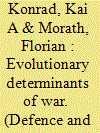

|
|
|
|
|
| Summary/Abstract |
This paper considers evolutionarily stable decisions about whether to initiate violent conflict rather than accepting a peaceful sharing outcome. Focusing on small sets of players such as countries in a geographically confined area, we use the concept of evolutionary stability in finite populations. We find that players’ evolutionarily stable preferences widen the range of peaceful resource allocations that are rejected in favor of violent conflict, compared to the Nash equilibrium outcomes. Relative advantages in fighting strength are reflected in the equilibrium set of peaceful resource allocations.
|
|
|
|
|
|
|
|
|
|
|
|
|
|
|
|
| 5 |
ID:
144799
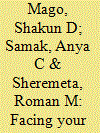

|
|
|
|
|
| Summary/Abstract |
We experimentally investigate the effect of social identification and information feedback on individual behavior in contests. In all treatments, we find significant overexpenditure of effort relative to the standard theoretical predictions. Identifying subjects through photo display decreases wasteful effort. Providing information feedback about others’ effort does not affect the aggregate effort, but it decreases the heterogeneity of effort and significantly affects the dynamics of individual behavior. A behavioral model that incorporates a nonmonetary utility of winning and relative payoff maximization explains significant overexpenditure of effort. It also suggests that decrease in “social distance” between group members through social identification promotes prosocial behavior and decreases overexpenditure of effort, while improved information feedback decreases the heterogeneity of effort.
|
|
|
|
|
|
|
|
|
|
|
|
|
|
|
|
| 6 |
ID:
157194
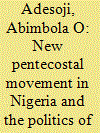

|
|
|
|
|
| Summary/Abstract |
The Pentecostal Movement in Nigeria, like elsewhere, is a distinctly Christian organization by virtue of what it professes and what characterizes it. Increased privileges for leaders, leadership visibility and leadership style have tended to encourage other aspirants to form similar organizations. Despite the existence of an umbrella association like the Pentecostal Fellowship of Nigeria, different centres have emerged, each seeking relevance and influence. Using historical and sociological approaches, this paper discusses the trends in the New Pentecostal Movement in Nigeria, identifies some characteristic types and probes into the basis for belonging, seeking to belong or otherwise. It also interrogates the strategies employed and its effectiveness or otherwise.
|
|
|
|
|
|
|
|
|
|
|
|
|
|
|
|
| 7 |
ID:
116235
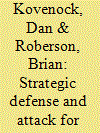

|
|
|
|
|
| Publication |
2012.
|
| Summary/Abstract |
The contest-theoretic literature on the attack and defense of networks of targets focuses primarily on pure-strategy Nash equilibria. Hausken's 2008 European Journal of Operational Research article typifies this approach, and many of the models in this literature either build upon this model or utilize similar techniques. We show that Hausken's characterization of Nash equilibrium is invalid for much of the parameter space examined and provides necessary conditions for his solution to hold. The complete characterization of mixed-strategy equilibria remains an open problem, although there exist solutions in the literature for special prominent cases.
|
|
|
|
|
|
|
|
|
|
|
|
|
|
|
|
| 8 |
ID:
116236
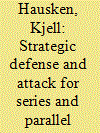

|
|
|
|
|
| Publication |
2012.
|
| Summary/Abstract |
Kovenock and Roberson's (2012a, b) replication of Hausken's (2008a) equations and parameter restrictions do not enhance our insight into the defense and attack of reliability systems. This reply intends to fill the remaining understanding gaps.
|
|
|
|
|
|
|
|
|
|
|
|
|
|
|
|
| 9 |
ID:
116237
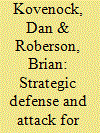

|
|
|
|
|
| Publication |
2012.
|
| Summary/Abstract |
In our original comment, we showed that Hausken's characterization of Nash equilibrium is invalid for much of the parameter space examined and provided necessary conditions for his solution to hold. Most of the comments in his reply are either tangential or irrelevant. However, several of the claims made in the reply reveal continuing misunderstandings and gaps in his understanding. In this rejoinder, we briefly clarify the fundamental issues.
|
|
|
|
|
|
|
|
|
|
|
|
|
|
|
|
| 10 |
ID:
116238
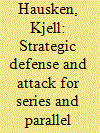

|
|
|
|
|
| Publication |
2012.
|
| Summary/Abstract |
Kovenock and Roberson's [2011] comment provides initial work which has the potential, when suitably extended, to advance the research frontier. Kovenock and Roberson's paper consists of three sections. The first section is an interesting introduction. The second section, titled 'Model and Main Result,' provides no contribution beyond Hausken [2008a]. It consists of Equations (1)-(10) which are equivalent to equations developed by Hausken, and Equation (11) which is equivalent to the utility requirements u??0 and U??0 provided after Equation (17) in Hausken. The third section provides interesting ideas about mixed-strategy equilibria that can be extended in future research.
|
|
|
|
|
|
|
|
|
|
|
|
|
|
|
|
| 11 |
ID:
162246
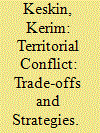

|
|
|
|
|
| Summary/Abstract |
We study a war scenario in which the winner occupies the loser’s territory. Attacking a territory increases the chance of winning, but also causes harm, which in turn decreases the territory’s value (i.e. the reward of winning). This paper highlights the effects of this trade-off on the equilibrium strategies of the warring states in a contest game with endogenous rewards. Providing both static and dynamic models, our analysis captures insights regarding strategic behavior in asymmetric contests with such conflict.
|
|
|
|
|
|
|
|
|
|
|
|
|
|
|
|
| 12 |
ID:
151706
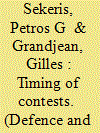

|
|
|
|
|
| Summary/Abstract |
We develop a simple model to analyze the timing of contests. When the odds of winning a contest are exogenously given – we show that if either the players discount the future or if the total cost of contest is smaller in the future – there exist subgame perfect equilibria where both players settle, anticipating a contest in the future. With endogenous efforts, the aggregate efforts expanded in a contest are smaller if the contest occurs in the future when the relative effort productivities remain constant or diverge over time, thus creating scope for delay in contests. When the effort productivities converge over time, the total efforts may be greater under a future contest. As a consequence, players either settle over the two periods, or else they initiate a contest immediately.
|
|
|
|
|
|
|
|
|
|
|
|
|
|
|
|
|
|
|
|
|